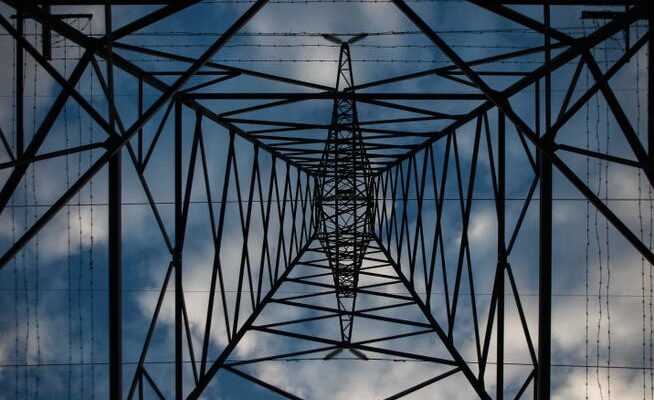Electricity companies are to be helped with up to CHF 10 billion. However, it is primarily the companies and their owners who should make provisions for political risks. It seems as if the Corona crisis has reduced the political inhibitions for large-scale rescue operations.
Almost like looking into a kaleidoscope: a symmetrical view of a power pole from below.
Politicians like to place unpleasant news in the run-up to the holidays because the citizens have completely different things on their minds. What Federal Councilor Simonetta Sommaruga announced on Thursday is really something: the federal government wants to support the electricity industry with up to 10 billion francs in an emergency.
What happened? Electricity companies sell their electricity on exchanges. Because the prices also fluctuate strongly because of the Ukraine war, the trading centers want to protect themselves against failures. They therefore ask the participants to deposit more and more money. As a result, Alpiq got into trouble last autumn and applied to the federal government for support, which it later withdrew. Even then, the industry was forewarned: This could not remain without consequences, said the magistrate.
The big shortcomings of the rescue
However, the outlined rescue package has three serious shortcomings: Firstly, the major electricity companies are already in the hands of state actors, i.e. cantons, municipalities and local suppliers. It is up to these owners and not the federal government to provide their companies with the necessary funds, even in turbulent times.
At the press conference, it was emphasized several times that the umbrella of the federal government was only “subsidiary”. But does that not sap the motivation of the owners to set up a defensive mechanism themselves?
Second, power companies aren’t banks: they have equity ratios of around 50 percent (rather than 1 or 2 percent), and they own power plants that produce a commodity that’s in high demand these days: electricity. If a single company gets into trouble, one should not intervene.
Thirdly, and related to this, it is not the companies themselves that are “critical to the system”, but it is important to ensure the power supply. In order for this to succeed, two conditions must be met: Firstly, the companies must provide information about the risks in electricity trading and thus the mutual interdependencies of the supervisory authority. This is also what the federal government has in mind and should be supported.
On the other hand, you also have to know what happens in the event of bankruptcy, for example if an owner of a nuclear power plant fails. Who then has access to the production? According to their own statements, the three big Swiss electricity companies have “started” a project for this purpose. But then the question is: Why only now, and why didn’t the federal government put pressure on much earlier so that such emergency plans can be pulled out of the drawer if necessary? Even before the turbulence that has been going on since autumn 2021, it was no secret that the power supply is critical for a country.
Inhibition threshold for help lowered
Ultimately, there is only one conceivable scenario that could justify state intervention: if an embargo were imposed on Russian natural gas and prices shot up to such an extent that rows and rows of European suppliers would find themselves in acute liquidity difficulties. For this, companies should primarily equip themselves with additional buffers. But does the federal government really have to announce today how and with how much money it is ready? Sometimes ambiguity is not the worst strategy – but the authorities can and should still exchange ideas with the companies. After all, it’s all about three companies: Axpo, Alpiq and BKW.
Opening the rescue package would certainly have been more difficult if the billions in aid from the Corona crisis had not been available. In any case, the inhibition threshold for state support seems to have fallen in politics. The help mentality not only increases the influence of the state temporarily, but permanently. And it will tempt other sectors to knock on the door of the federal government when difficulties arise. Who can say no with a clear conscience?
